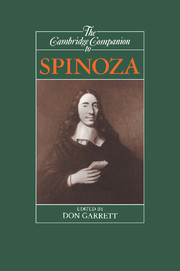Book contents
- Frontmatter
- Introduction
- 1 Spinoza's life and works
- 2 Spinoza's metaphysics
- 3 Spinoza's theory of knowledge
- 4 Spinoza's natural science and methodology
- 5 Spinoza's metaphysical psychology
- 6 Spinoza's ethical theory
- 7 Kissinger, Spinoza, and Genghis Khan
- 8 Spinoza's theology
- 9 Spinoza and Bible scholarship
- 10 Spinoza's reception and influence
- Bibliography
- Index
6 - Spinoza's ethical theory
Published online by Cambridge University Press: 28 May 2006
- Frontmatter
- Introduction
- 1 Spinoza's life and works
- 2 Spinoza's metaphysics
- 3 Spinoza's theory of knowledge
- 4 Spinoza's natural science and methodology
- 5 Spinoza's metaphysical psychology
- 6 Spinoza's ethical theory
- 7 Kissinger, Spinoza, and Genghis Khan
- 8 Spinoza's theology
- 9 Spinoza and Bible scholarship
- 10 Spinoza's reception and influence
- Bibliography
- Index
Summary
So the Philosophers . . . follow virtue not as a law, but from love, because it is the best thing. (Ep 19)
Spinoza is in many ways - and as many have observed - a philosopher in the Cartesian tradition. His first published work was an elucidation of Descartes's Principles of Philosophy, and Descartes is the only philosopher named and discussed in the Ethics. Some of his most fundamental metaphysical and epistemological doctrines are Cartesian, while many others appear to result from reflection on various difficulties in Descartes's position. His physics, too, is largely Cartesian. Despite this unmistakable influence, however, Spinoza's guiding intellectual purpose was quite different from Descartes's. Descartes sought primarily to improve the sciences - for himself and for others - by providing a better foundation for them. He justified this endeavor ultimately on the grounds that it would bring human beings greater mastery over nature. Spinoza, in contrast, sought primarily to improve the character of human beings - both himself and others - by improving their self-understanding. He justified this endeavor ultimately on the grounds that it would bring human beings peace of mind as integral aspects of nature.
- Type
- Chapter
- Information
- The Cambridge Companion to Spinoza , pp. 267 - 314Publisher: Cambridge University PressPrint publication year: 1995
- 14
- Cited by

